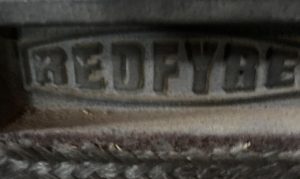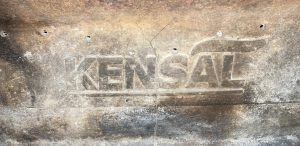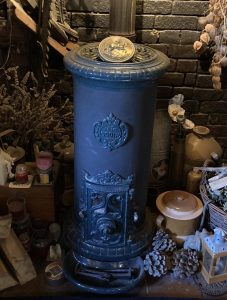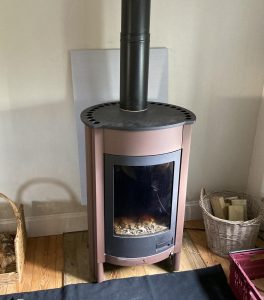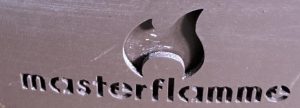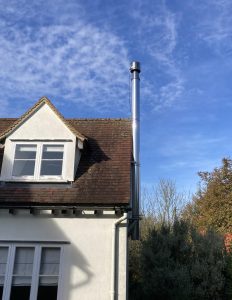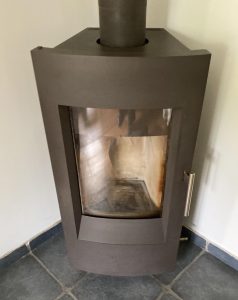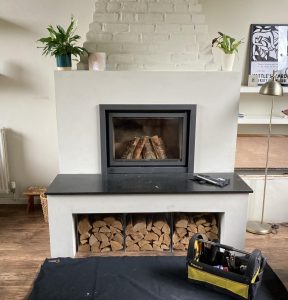I thought for this week’s blog I would do something about some more of the beautiful medieval churches we have visited whilst sweeping for the Dioceses of Chelmsford. These blogs examples were all located around Colchester, and were all swept on the same lovely warm summers day this year. So as with all the work we do for the Bishop of Chelmsford, there was lots of driving involved! But this does mean that we get to see lots of the beautiful Essex countryside and some fantastic historic monuments in the churches themselves. What’s not to like!
St Mary’s Church Dedham
St Mary’s church in Dedham is one of my favorites, located in Constable Country, positioned right in the center of the village, right next to its old vicarage with its Georgian façade, it is so picturesque and historic.

The W. tower of this church (seen left, from the northeast, and at the foot of the page, from the southeast), which is known to have been complete by 1520, was credited by Dr. John Harvey to the great John Wastell (The Perpendicular Style, London, Batsford, 1978, p. 229). (See the entry for St. Mary’s, Isleham, in Cambridgeshire, for a more detailed consideration of Wastell’s work and style.) However, the rest of the building, which is also of high quality and appears to be contemporary, is more closely related to the chancel chapels at St. James & St. Paul’s, Colchester, the arcade arches above the piers at Stratford St. Mary, just across the county border in Suffolk, and – going backwards in time – the nave arcades at St. Mary’s, Martham (Norfolk) and the aisled nave at Blackfriars’ church (now St. Andrew’s Hall), Norwich, at the last two of which buildings the master mason was considered by the late Birkin Haward to have been Robert Everard (fl. 1440-85), who led operations at Norwich Cathedral from c. 1452 (Suffolk Mediaeval Church Arcades, Hitcham, Suffolk Institute of Archaeology and History, 1993, p. 387). Everard had an assistant by the name of John Antell, who appears to have died in the same year as his master but who may nevertheless have inherited the use of Everard’s moulds, enabling him to pass them on to other masons in his family. Of these, the most important appears to have been Robert Antell, perhaps a son or grandson. If these deductions are correct, then with the W. tower excepted, it seems likely that Robert Antell was the master mason for the reconstruction of the rest of the church, both on stylistic grounds and through his professional connections with Wastell. Work appears to have commenced around 1492, probably starting at the E. end with the remodelling of the chancel, which is the only part of the building where some of the earlier masonry has been retained. The new nave aisles at Dedham, like the chancel chapels at St. James and St. Paul’s, Colchester, are lit by tall three-light windows with supermullioned tracery, trefoiled ogee lights, strong mullions, and quatrefoil oculi (see the N. aisle window, above right), and the six-bay nave arcades, like the two-bay chancel arcades at Colchester, are similarly composed of narrow rhomboidal piers with four attached semicircular shafts separated by casements, from which spring arches (four-centred here but two-centred at Colchester) with ogee points that rise, like the pier shafts towards the nave, to corbels on which the wall posts of the roof appear to rest. (The N. arcade is illustrated left.) These ogee points may have been a peculiarity of Antell’s as they are not evident in Everard’s work.
Dedham church shares with St. Mary’s, Saffron Walden and St. Mary’s, Thaxted, the distinction of being one of the three grandest Perpendicular churches in Essex, and although of these three, only Dedham lacks a spire (albeit Saffron Walden’s spire was only added in 1832), the tower still impresses by its height, rising in four flint-built stages to flushwork battlements, supported by large clasping, polygonal buttresses that terminate in crocketed pinnacles. These render the tower an example of what Dr. Harvey called the ‘turreted design’, a form he traced back to work at Lincoln Cathedral by Richard of Stow in 1306-11, and in East Anglia, to St. Mary’s, Stoke-by-Nayland (Suffolk), where construction was underway in the 1450s and ‘60s (The Perpendicular Style, pp. 175 & 179). Thus Wastell came late to this design, but he first revived it on the grandest possible scale for the central tower at Canterbury Cathedral (‘Bell Harry’), which was complete by 1496. Here at Dedham, a through-passage with slightly pointed tunnel vault decorated with brattishing, Tudor flower and portcullises, runs north to south beneath the tower (made necessary by the tower’s abutting on the churchyard boundary), under two-centred arches with traceried spandrels and labels. This vault is similar to work by Wastell at Great St. Mary’s, Cambridge. The tower bell-openings are three-light with split-Ys and inverted daggers above the outer lights. In the stage below (the third stage) there are simple two-light windows, while the great W. window running through the first and second stages has tracery formed of four lights subarcuated in pairs, split Ys, and two quatrefoils and a dagger in the head.
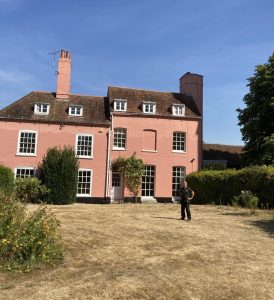
In fact, all the windows at Dedham deserve careful study for besides the aisle windows described above, there are also interesting and pleasing windows in the chancel which may or may not be by Antell. To the north and south these are each formed of three trefoiled, ogee-pointed lights with strong mullions, two tiers of reticulation units, subarcuation of the outer lights, and centre lights with latticed supertransoms and quatrefoil oculi. (See the N. window, right.) The E. window has been renewed but may represent the original form: this has five ogee-pointed lights, intersecting subarcuation of the lights in threes, through reticulation, latticed supertransoms above lights 2 and 5, and a double-cusped quatrefoil oculus – a veritable tour de force. (See the glossary for an explanation of these terms.) The clerestory windows, two per bay, also manage to fit supermullioned tracery with split-Ys beneath their depressed arches, so the designs are nowhere mean. There are no chancel chapels but the aisled nave has a two-storeyed porch on either side (although the S. porch, now the vestry, is today open to the roof). The N. porch has three-light supermullioned windows to the east and west, and a two-light N. window to the upper storey, on either side of which there is a renewed niche. The label (rectangular drip-stone) above the outer doorway is supported on the crowns of two lions couchant and there is flushwork on the battlements and the outer faces of the diagonal buttresses. At the northwest angle, a stair turret topped by battlements, rises higher than the porch itself.
Finally, the elaborate tomb canopy and chest in the N. aisle, from which the brass is now missing, commemorates Thomas Webbe (d. 1506), who seems to have paid for much of this building. It displays shields in double-cusped quatrefoils around the chest and again beneath the canopy, and brattishing and Tudor flower in quatrefoils beneath the archivolt, while above, carved vines surround the panel where the brass should be, and above again are the heads of a king and queen beneath battlements. However, although Webbe’s money provided Essex with one of its proudest churches, it appears to have contributed almost nothing in mediaeval carpentry and Hewett, indeed, did not even mention the building in his gazetteer of Essex churches (Church Carpentry, London & Chichester, Phillimore, 1982). Perhaps this is not surprising to judge from the quality of the present chancel roof with its large and very ugly angels holding shields beneath the wall posts. These date from 1960 so whoever permitted them to be installed should certainly have known better.
St John the Baptist Layer De La Haye
The name Layer de la Haye is one of the most romantic and attractive names in the Colchester area, and visitors to the village are very interested in its origin. The original name is to be found in Domesday Book (1086) where it is found simply as “Legra”. This is probably a Latinised form of the Saxon name. Up to the thirteenth century it appears in various documents as Legra, Leigre, or Leghere. There are two theories about the origin of the name; one is that it is associated with the old Norse word “leirr” or “leger” which means clay. P. H. Reaney in his book, “The Place Names of Essex,” says that this theory cannot be supported etymologically. In any case, it is only partly true, geologically speaking, for there is a great deal of gravel in the parish as well as clay. The second theory is that the answer to the problem is to be found in the existence of the Layer Brook, for this name Legra or Leger was given to three distinct settlements in the vicinity: viz: Layer de la Haye, Layer Marney and Layer Breton. P. H. Reaney points out that this name Legra or Leger is identical with another river which gave us Leicester (Ligeraceaster) and also with the French river Loire. This sounds a most feasible explanation. There is a third theory which does not appear to have much support, which says that the name Layer comes from an Anglo-Saxon name for a camp “legr”.

The second part of the village’s name traces its origin to Normandy. The original family of de la Haye probably came from the Val de la Haye, twenty-two miles east of Rouen, the home of Maurice de Haia. “La Haye” is said to be the French form of the Saxon word “hage” which represents a Roman Villa. The name “Hay” is a more modern form as found in the name Fotheringhay. The “haga” is the “ham” (home) surrounded by a domain. “The Hague” is a disguised form of the same word. At La Haye near Rouen was an establishment of Knights Templar who may have had some connection with the interesting manor of Blind Knights in this parish.
At the time of the Norman Conquest a Saxon freedman name Aelric was Lord of the Manor of Layer de la Haye. He had cleared three hundred and thirty acres of forest land. William the Conqueror gave the manor of Aelric to Eustace, Earl of Boulogne, who was the grandfather of Queen Maud, the wife of King Stephen. Thus the manor became Crown property. The first account of a tenant of the Earls of Boulogne appears in a charter of 1128 which states that the Benedictine Abbey of St. John the Baptist at Colchester, owned the church of “hea” (Layer de la Haye) and two thirds of the tithe of Legra, the demesne of Walter de la Haye. A descendant of Maurice de Haia known as Juliana de Haia, held Layer de la Haye before 1185. It is interesting to find the following note in the official guide to Lincoln Castle – “in the course of the quarrel between King John and the barons, the castle was held for the king by the aged Nicholas de la Haye.” Later in the notes this appears:-
“The constableship of the castle, hereditary in the family of Haye, passed by marriage to Henry de Lacy, Earl of Lincoln.”
It is quite possible that the present name of the parish was given to it late in the twelfth century. It appears in different forms from the beginning of the thirteenth century. Though many people including the local authorities and newspapers have added hyphens to the name this device is historically incorrect. In all ancient documents the name always appears without hyphens.
The de la Hayes were very generous benefactors to the Benedictine Abbey of St. John the Baptist at Colchester. A member of the family, Hugh de la Haye was Abbot from 1130 to 1147. In a charter granted by Richard I to the first Priory in England of the Augustinian Canons at St. Botolph’s Colchester, they held “The church of Legra and all its emoluments,” presumably tithes and lands. The Priory also provided a parish priest. There seems to be no accounting for the fact that the property changed hands from the Abbey to the Priory at this time.
The de la Hayes were lords of the manor until the death of Ralph de la Haye, but the manor remained in the hands of his widow Lucia during her life time, and then reverted to one William de Munchensi.
Incidentally, it is believed that the name “Munson”, a well known local Essex name is the Anglicised form of Munchensi. William had, for some reason, claimed the property after the death of Ralph, but Lucia laid claim to it as a joint property “wherewith her husband had endowered her when he espoused her at the church door.” Which church door it does not say. The lands, however, were forfeited to Queen Eleanor in 1291 on account of a misdemeanor of the son of William de Munchensi, but they were restored on condition that he took part in the Crusades.
The arrival of the Black Death wiped out many in Layer de la Haye including the Layer Munchensis. The Black Death, which affected the whole of England, was a kind of bubonic plague and it decimated the population of the country. It caused the beginning of the breakdown of the feudal system and was the direct cause of the fusion of Anglo-Saxons and Normans. Those landowners who survived the plague were unable to find sufficient labour and there began the yeoman system of sub-tenant farming.
The monks of the Augustinian Priory at Colchester began immediately after the plague to restore the derelict church of Layer de la Haye. They rebuilt the nave, the tower and the north porch. Later they rebuilt the chancel arch and placed in the belfry the church’s oldest bell. The stone it is said, came from quarries in Caen in France which supplied a great deal of stonework for English Churches. The bell, the second largest in the tower, erected by the Priory, is said to have been cast by a woman, Joanna Sturdy in 1459. Her husband John died in 1458 and he was a renowned bell-founder at Sudbury. (John and Johanna Sturdy were bellfounders at London, not Sudbury. Perhaps there has been some confusion with the founder of another of the bells, Thomas Gardiner, who was at Sudbury) His widow continued the industry. The bell, which is still used, bears the Latin inscription “In Multis Annis Resonet Campana Johannis,” (May John’s bell ring for many years).
In 1495 we hear of the first recorded Vicar of Layer de la Haye – Ralph Richardson. We also hear of the theft of a Missal from Layer Church by one Thomas Lymenour who, as a debtor had taken sanctuary at St. John’s Abbey. He left the Abbey on the Feast of St. Bartholomew (August 24th) in 1415, and committed his crime at Layer de la Haye. He was caught by a monk, tried by the Abbot and fined forty shillings.
The next important lords of the manor were the Teys who gave their name to the villages of Marks Tey, Great and Little Tey. They were a family of considerable standing in the vicinity and acquired large estates including that of the manor of Layer de la Haye.
The first member of the family we hear of as lord of the manor was Sir Robert Tey and he was succeeded by his grandson in 1426. A great-grandson, during the Wars of the Roses, was ordered by Henry VI to resist the Earl of Warwick the Kingmaker. John, we are told, “was not to be hanged for talking.” and placed the motto “Tais en temps” in a window of his manor house. This house stood on the site of the present Layer Hall and was there for more than three centuries. A descendant, Thomas Tey, lived at the time of the Dissolution of the monasteries and died in 1543. He and his wife were buried in a grey Purbeck marble tomb with which is combined an Easter Sepulchre (N.B. the Blessed Sacrament was placed within on Maundy Thursday and a watch kept throughout the night). This tomb is on the north side of the Sanctuary. Originally, under the canopy there were two brass figures of Thomas and his wife. The tomb bore the following inscription:
“Of your charite pray for the soules of Thomas Tey Esquire, some time of this town of Layer, and Jane his wife, on who(se) soules and all christen Jeshue have mercy.”
The brass figures and inscriptions have disappeared but the tomb remains though somewhat weather-beaten. This is no doubt due to the ruinous condition of the church in earlier days. On the south wall of the chancel until some time after 1622, there was a monument to another member of the Tey family who was known as “Standing Tey.” This sobriquet was applied to him “for upon an occasion of fighting a duell he vowed if he had the victory he would never take his meat but standinge.” It is obvious what the result of the duel was.
A member of the Tey family became Vicar in 1569 and it is said that he provided the church with its Elizabethan Chalice and paten or cover; one of the treasures of the parish. In a catalogue on church plate the following details are given of this chalice and paten.
a) Cup Silver 9¾ ozs height 6.1/8″; diameter of bowl 3¾”; diameter of foot 3¾”. It bears no maker’s name and has no inscription.
b) Paten silver 1 oz 9 dwt; height 1.1/8″; diameter 3.7/8″; diameter of foot 1″. It has no marks except the sacred letters “I.H.S.” which may be found beneath the canopy.
The Chalice has a straight-sided bowl inclining outwards towards the lip on a wide trumpet stem, which is probably not the original stem but replaced the original when the chalice was at one time repaired. It is united to the base of the bowl by a slightly decorated knop. Below the lip the bowl is encircled by a band of the conventional strap-work rather faintly executed. The foot is similarly decorated. On the cover is a triple band of interlacing strapwork. A Visitation record of 1684 records that the church possessed “a flaggon and patten of pewter,” but no mention of these was made in a later visitation in 1707.
The next interesting owner of the manor of Layer was a Colonel John Brown who served under the famous Duke of Marlborough and he became a general in 1754. In 1756 the General made a will in which he expressed a wish to be buried at Layer de la Haye Churchyard. He left £100 to the poor of the parish. When he died in 1764 he was buried in the gardens of his house in France but his remains were brought home and re-buried in what was described as a “handsome vault” at Layer de la Haye churchyard. The “vault” is an obelisk over the general’s presumed grave. It takes the form of a stylised cannon surrounded by stone cannon balls. The obelisk bears the following flowery and verbose inscription, typical of the 18th century:-
To the memory of Lieut-General Brown whose military merit was founded under the auspices and confirmed by the approbation of John, Duke of Marlborough, and whose many private virtues and amiable qualities were long beloved and venerated and at last sincerely bewailed by all who enjoyed his friendship or were acquainted with the character of a humane, homely and honourable man, Lady Frances Burgoyne erected this monument as a testimony of his worth and of her own respect and gratitude.
This must surely be one of the longest sentences in the English language! Lady Frances Burgoyne was a daughter of the second earl of Halifax and she married a cousin of the ill-fated General Burgoyne who figured prominently in the loss of the American colonies at the time of the American War of Independence.
Within three years of the death of the general, his manor house which for 300 years had stood opposite the church, was either burnt down or pulled down by the new owner. The tenant farmer, a Dan Rudkin, moved into the Cross House, which for the next eighty years was known as “The Hall”. Morant says that the Tey coat of arms which were in Layer Hall were transferred to the windows of the Cross House.
Legend has it that the manor of Blind Knights which lies a mile south-east of the church, was, during the times of the Crusades, a kind of hospital for those knights who had lost their limbs and eyesight in battle. A more prosaic explanation offered by a recent historian is that the manor at one time belonged to a blind man whose name was Knight! There is no evidence for either explanation but the former is more feasible and defensible on the grounds that several such hospitals did exist throughout the country. The name Blind Knights appears in a document of 1364 and the house itself is very ancient with medieval semi-circular and curved doorway arches of oak. It is possible that a house has existed on this site for more than eight centuries. Outside the building at the foundations of the old bakery is some ancient brickwork which incorporates some Caen stone and Roman brick, similar to the material (Septaria) used in the 12th century chancel of the church.
In 1289, John the son of Adam de Ry gave one hundred and sixty acres of land at Layer de la Haye to St John’s Abbey, and the name is perpetuated in the name of the manor of Rye, now known as Rye Farm. The farm has a medieval moat and this was used for defensive purposes. At the end of the fifteenth century the Abbey built a house on this land now called “The Greate House”. There was originally a toll-gate across the road immediately opposite the house and this probably accounts for the name “Gate House,” now corrupted to “Great House.”
A Colcestrian, Sir Thomas Audeley, who became Lord Chancellor after the Dissolution of the monasteries 1536 – 1539, appropriated the manors of Rye and Blind Knights, together with the Mill and the patronage of the living. Since that time for nearly four hundred years, all the former monastic lands and property in Layer de la Haye formed part of the Berechurch Hall estate. Thomas Audeley appropriated the Augustinian Priory of St. Botolph’s at the same time as he appropriated the manor of Blind Knights. As well as receiving the advowsons of Layer de la Haye he also received those of St. James, St. Peter’s and St. Martin’s at Colchester. In July 1538, St John’s Abbey at Colchester granted Audeley the manor of “Goosebeks” at Stanway as well as that of Rye, in return for the rectory and advowson of Long Compton in Warwickshire.
The Parish Church stands on a prominence overlooking the South Essex Reservoir, and beyond can be seen the river Blackwater and the Bradwell Atomic Power Station. From the Church tower can be seen the churches of Layer Breton, Birch, Great Wigborough, Peldon and Abberton. Until recently the church had no dedication though in 1877 the incumbent headed his register “St. James’ Church, Layer de la Haye”. Though why and on what authority we do not know. In more recent years the Parochial Church Council discussed whether the church should be known as St. George’s or St. John’s though nothing came of it. In 1962 the church was given the dedication of St John the Baptist on account of the association of the parish with the former Benedictine Abbey of that name at Colchester. Strange to say, there can be found no record anywhere of an earlier dedication and it is assumed that though the monks ministered here in this parish, the church was probably regarded as a chapel-of-ease. As Lord Alport has written in his admirable little booklet, “This ancient church has stood at the heart of the Parish of Layer de la Haye since Norman times.”
A portion of the south-east angle of the nave is Norman and the chancel is mainly twelfth century, but the rest of the church, apart from the south aisle is fourteenth century. The south aisle was added in the middle of the 19th century. The church has a north porch with a fourteenth century gable, and a tower of the same date with diagonal buttresses and battlements. On the interior walls of the tower can be traced two blocked-up doorways, one of which led to the minstrels’ gallery. There are indications that formerly there was a West door in the tower. The gallery which was removed in the nineteenth century also contained a barrel organ which played a limited number of tunes; about six. This instrument may now be seen in the Colchester Museum. The organ was made by Imhof & Co. Ltd., of Bedford Street, London. It appears, by the decorations on the instrument, that it was probably in private hands originally as they are by no means of an ecclesiastical nature. The barrel organ was in use in Layer de la Haye Church during the incumbency of John Dewhurst who was Vicar from 1845 to 1869. The organ’s repertoire was rather limited and included the “Old Hundredth” and a tune now no longer recognisable and which was known as “Layer de la Haye.” In 1965 this barrel organ was restored for the Museum authorities by Mr. Alan Kitley of Layer de la Haye.
The Tey tomb, already mentioned, stands in the Sanctuary on the north side, and on the south side is a fifteenth century piscina and also a blocked window of unknown date. In 1964 a twelfth century window was found blocked up on the north side of the chancel. This was opened up after it was discovered that it was bricked up on the outside and on the inside, and a sheet of plain glass semi-circular in shape was inserted. This window was restored in memory of the late Mr. 0. S. Pawsey by Mrs. Pawsey. In 1962 a new window of clear glass which gives a beautiful view over the reservoir was placed on the south side of the chancel in memory of the late Miss Emily Digby. It was given by Miss L. Digby. During repairs to the church in 1965 a thin layer of cement was removed from the chancel walls, thus revealing the 12th century stonework (Septaria). At the instigation of the Vicar and Churchwardens, this stonework was “pointed” and restored to its former condition.
In the same year another blocked window was opened up on the south side of the chancel and is to be used as a recess into which will be placed the lovely African carving of the Madonna and Child. The carving was presented to the Church by Lord Alport and was executed at Cyrene art School in Africa.
A great deal of Roman brick was used in the construction of the chancel and tower and one may speculate as to the origin of these bricks. There are so far, no records of Roman habitation in this parish though it is conceivable that some important people from the Roman Colonia (Colchester) may have built themselves villas in this area. Though it is not definitely established, it appears that there was regular Roman traffic passing through Layer de la Haye between Colchester and West Mersea. On the other hand as far as building material is concerned, the builder-monks may have brought a good deal of their building material from the ruined Roman houses of Colchester.
The tower contains five bells, one of which has already been mentioned. The bells are inscribed as follows:-
1. Thomas Mears of London fecit 1792 (30″)
2. Thomas Gardiner Sudbury fecit 1724 (32″)
3. Miles Gray made me 1673 (34″)
4. In Multis Annis Resonet Campana ]ohannis (39″)
5. Miles Graye made me 1622 (42″)
The Miles Graye who made the fifth bell was the father of the maker of the third bell. (It is now thought more probable that the older Miles Graye was the grandfather, rather than the father, of the younger Miles Graye, but this remains unconfirmed) On bell No. 2. are to be found very clear impressions of eight coins of the reign of George I. (There are grounds for thinking that there may be eight actual coins set into the bell, not just impressions. The matter is being investigated.)
The bells were inspected in 1904 and declared to be not in ringing order.
Since that time the bells have been chimed only by means of ropes which reach to the floor of the tower. Is it a pious hope that one may once again hear these bells properly rung? (The hope was fulfilled when a major bell restoration project was completed in January 2001, at which time a new sixth bell – the Lufkin bell – was added.)
There is a local tradition of bell-ringing after a death; three for a man, two for a woman, one for a child.
The registers of the church date from 1755; a former incumbent having lost or otherwise disposed of the earlier records which dated from 1678 at least, though it is possible that they went back to the middle of the sixteenth century. They disappeared between 1830 and 1900.
St Mary’s Church Langham
The medieval St Mary’s Church is approached via a private road along an avenue of lime trees through the Langham Hall Estate in the northern part of Langham. It has a remarkably beautiful setting in the Dedham Vale Area of Outstanding Natural Beauty (AONB) overlooking the Vale itself. It is featured in a number of John Constable’s best-known paintings, most notably the several versions of “The Glebe Farm and Langham Church”.
The Grade I listed building, consisting of a chancel, nave and south aisle, is largely of pebble-rubble and pudding-stone construction of various dates from the 12th to 19th centuries. It was re-ordered in the 1860s and 1890s and now seats about 130 people. In the 1980s the exterior of the church was extensively restored and in 1994 a major renewal programme was initiated (see Section 6), of which the most obvious manifestations so far are the elegant gallery and fine organ at the west end and the baptistry in the south aisle.

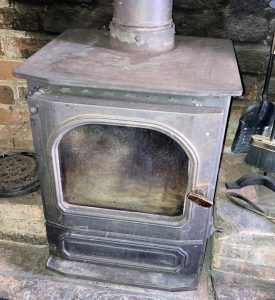
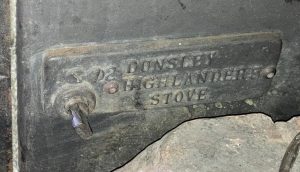
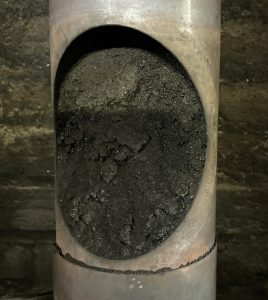


 My name is Paddy McKeown, I am a retired police officer (Detective Sergeant – Metropolitan Police), turned chimney sweep. I have completed training with ‘The Guild of Master Chimney Sweeps’, and Rod Tech UK (Power Sweeping).
My name is Paddy McKeown, I am a retired police officer (Detective Sergeant – Metropolitan Police), turned chimney sweep. I have completed training with ‘The Guild of Master Chimney Sweeps’, and Rod Tech UK (Power Sweeping).
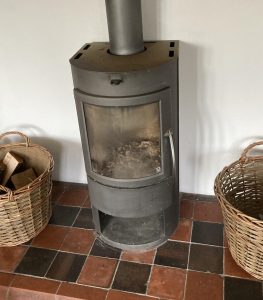
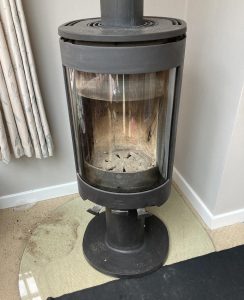
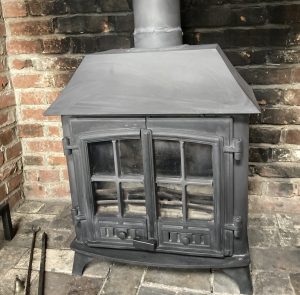 Here is something I was very surprised to find and something of a bit of a mystery. Yes, I hear you saying, that is surely a Stovax Stockton Stove, but is it? On closer inspection there are subtle differences in manufacture, not least of this the embossed names of Redfyre and Kensal on the stove. I too was initially somewhat dumbfounded and asked the customer who and when had the stove installed. The customer told me that a stove fitting company from Bury St Edmunds that is no longer in business installed the stove over 25 years ago. So, what is going on?
Here is something I was very surprised to find and something of a bit of a mystery. Yes, I hear you saying, that is surely a Stovax Stockton Stove, but is it? On closer inspection there are subtle differences in manufacture, not least of this the embossed names of Redfyre and Kensal on the stove. I too was initially somewhat dumbfounded and asked the customer who and when had the stove installed. The customer told me that a stove fitting company from Bury St Edmunds that is no longer in business installed the stove over 25 years ago. So, what is going on?